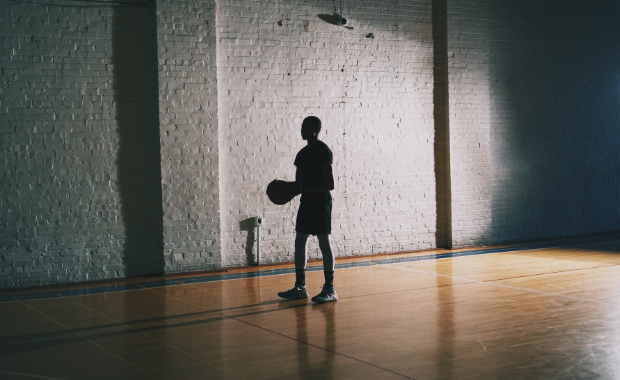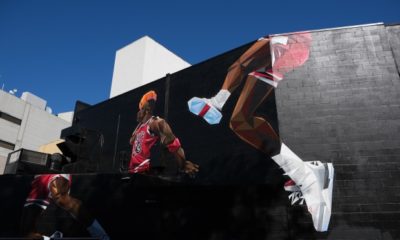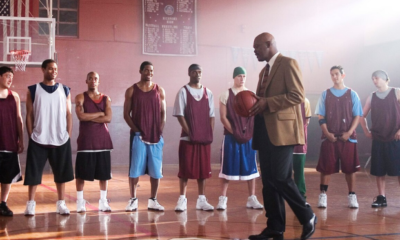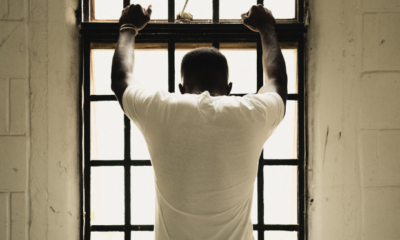Life
Question Yourself: What a Common Play in Basketball Teaches Us About Ourselves

If you’ve ever played or watched basketball, you know this play. The scramble for the loose ball. A player deflects a pass. Shawn Bradley [that lanky dude from Space Jam] is awkward, as per usual, and drops a pass thrown his way. A player dribbles the ball off of their own foot.
Two players from opposing teams scramble for it. Neither gains control of the ball yet both appear to have hit it. The trajectory of the ball is somehow altered and is sent careening out of bounds.
Neither player claims responsibility and both parties immediately launch into an over-the-top performative and surprisingly unnecessarily animated game of finger-pointing. Both players are suggesting that the other is at fault for the ball being sent out of play, each making the case for their team retaining possession.
Back when I played, there were more than a few times where I knew it was out off of me but I still plead my case. I’d wildly flail my appendages and point in the opposing team’s direction, loudly yelling about how it was off of the other player. However, maybe there’s actually something to this. Maybe we can actually learn about our own perception of the events in our lives because of a loose ball in basketball.
Are these players lying? Are they certain the ball went out off of them but pretending it didn’t to gain a competitive advantage? Or do they actually think it went out off of their opponent? Do two competitors participating in the same play experience it differently?
Much to my delight, researchers at Arizona State University who found themselves with way too much time on their hands somehow managed to get themselves paid to figure that out. Their findings were published in Science Advances.
Don’t Trust Your Perception
Ty Tang, a doctoral candidate in cognitive science, says that, in general, our subjective experience [“he touched it last!”] of an objective event [a loose ball that two players are chasing] is not trustworthy. ‘It’s very possible that people experience two different orders of events, two different experiences of reality, even though they experienced the same event.”
To test this, he ran three different experiments with ASU students. In the first, he had students sit across from one another with a divider between them. The divider had a slot for their hands and when a light flashed, each person tapped the other. They then indicated who they thought tapped first.
Most people perceived their touch as happening first. He then replaced the second human with a mechanically operated switch and got similar results. In the final experiment, they removed the element of touch and replaced it with a clicking sound. People still thought their touch happened before the click.
This bias makes sense in competitive situations. Coming back to the loose ball: it’s advantageous to believe that you touched it before your opponent indicating that they touched it last and your team should have possession. But what about outside of that?
“I have been up against tough competition all my life; I wouldn’t know how to get along without it.” – Walt Disney
What does this mean for us?
I’m still not convinced this wasn’t all just a thinly veiled excuse for a doctoral student to write a paper about basketball – but there’s interesting implications for our own understanding of reality.
Tang suggests this bias might be a result of our proclivity for attempting to predict what’s going to happen in our world and trying to build a mental model of reality before things have actually occurred.
First, we can learn to distrust our own judgments of events that have occurred. This doesn’t mean we should walk around in a constant haze of doubt, second-guessing everything that has happened to us. That wouldn’t get us anywhere, except maybe in an asylum. Instead, what we can do, is use the knowledge that our own perception is limited and biased as a launchpad for examining other ways of being in and seeing the world.
We can also entertain the idea that someone else’s perspective on an event is not only a valid interpretation but is equally as “real,” especially to them, as our own. This leads us to our second important takeaway.
“The difference between average people and achieving people is their perception of and response to failure.” – John C. Maxwell
Tang says, “Sometimes people actually do have different experiences of what happened and they’re not lying – they might have actually just experienced it that way. We can be more sensitive to other people’s perspectives. He says that “we really just want people to be more understanding of other people’s perspectives.”
These findings can facilitate a deeper understanding of our world and the perceptions that shape as well as develop a deeper empathy towards one another. Or maybe it was all just a clever ruse for a bored, overworked and underpaid grad student to write about basketball.
Tang ends his discussion with this: “We have identified what may be a principal cause of arguments in ballgames, and it’s about time.” Get it?
How do you handle conflict caused by a differing of opinions or perspectives? Share your tactics below!
Did You Know
How Skilled Migrants Are Building Successful Careers After Moving Countries
Behind every successful skilled migrant career is a mix of resilience, strategy, and navigating systems built for locals.

Moving to a new country for work is exciting, but it can also be unnerving. Skilled migrants leave behind familiar systems, networks, and support to pursue better job opportunities and a better future for their families. (more…)
Life
10 Research-Backed Steps to Create Real Change This New Year
This New Year could finally be the one where you break old patterns and create real, lasting change.

Every New Year, we make plans and set goals, but often repeat old patterns. (more…)
Life
9 Harsh Truths Every Young Man Must Face to Succeed in the Modern World
Before chasing success, every young man needs to face these 9 brutal realities shaping masculinity in the modern world.

Many young men today quietly battle depression, loneliness, and a sense of confusion about who they’re meant to be.
Some blame the lack of deep friendships or romantic relationships. Others feel lost in a digital world that often labels traditional masculinity as “toxic.”
But the truth is this: becoming a man in the modern age takes more than just surviving. It takes resilience, direction, and a willingness to grow even when no one’s watching.
Success doesn’t arrive by accident or luck. It’s built on discipline, sacrifice, and consistency.
Here are 9 harsh truths every young man should know if he wants to thrive, not just survive, in the digital age.
1. Never Use Your Illness as an Excuse
As Dr. Jordan B. Peterson often says, successful people don’t complain; they act.
Your illness, hardship, or struggle shouldn’t define your limits; it should define your motivation. Rest when you must, but always get back up and keep building your dreams. Motivation doesn’t appear magically. It comes after you take action.
Here are five key lessons I’ve learned from Dr. Peterson:
-
Learn to write clearly; clarity of thought makes you dangerous.
-
Read quality literature in your free time.
-
Nurture a strong relationship with your family.
-
Share your ideas publicly; your voice matters.
-
Become a “monster”, powerful, but disciplined enough to control it.
The best leaders and thinkers are grounded. They welcome criticism, adapt quickly, and keep moving forward no matter what.
2. You Can’t Please Everyone And That’s Okay
You don’t need a crowd of people to feel fulfilled. You need a few friends who genuinely accept you for who you are.
If your circle doesn’t bring out your best, it’s okay to walk away. Solitude can be a powerful teacher. It gives you space to understand what you truly want from life. Remember, successful men aren’t people-pleasers; they’re purpose-driven.
3. You Can Control the Process, Not the Outcome
Especially in creative work, writing, business, or content creation, you control effort, not results.
You might publish two articles a day, but you can’t dictate which one will go viral. Focus on mastery, not metrics. Many great writers toiled for years in obscurity before anyone noticed them. Rejection, criticism, and indifference are all part of the path.
The best creators focus on storytelling, not applause.
4. Rejection Is Never Personal
Rejection doesn’t mean you’re unworthy. It simply means your offer, idea, or timing didn’t align.
Every successful person has faced rejection repeatedly. What separates them is persistence and perspective. They see rejection as feedback, not failure. The faster you learn that truth, the faster you’ll grow.
5. Women Value Comfort and Security
Understanding women requires maturity and empathy.
Through books, lectures, and personal growth, I’ve learned that most women desire a man who is grounded, intelligent, confident, emotionally stable, and consistent. Some want humor, others intellect, but nearly all want to feel safe and supported.
Instead of chasing attention, work on self-improvement. Build competence and confidence, and the rest will follow naturally.
6. There’s No Such Thing as Failure, Only Lessons
A powerful lesson from Neuro-Linguistic Programming: failure only exists when you stop trying.
Every mistake brings data. Every setback builds wisdom. The most successful men aren’t fearless. They’ve simply learned to act despite fear.
Be proud of your scars. They’re proof you were brave enough to try.
7. Public Speaking Is an Art Form
Public speaking is one of the most valuable and underrated skills a man can master.
It’s not about perfection; it’s about connection. The best speakers tell stories, inspire confidence, and make people feel seen. They research deeply, speak honestly, and practice relentlessly.
If you can speak well, you can lead, sell, teach, and inspire. Start small, practice at work, in class, or even in front of a mirror, and watch your confidence skyrocket.
8. Teaching Is Leadership in Disguise
Great teachers are not just knowledgeable. They’re brave, compassionate, and disciplined.
Teaching forces you to articulate what you know, and in doing so, you master it at a deeper level. Whether you’re mentoring a peer, leading a team, or sharing insights online, teaching refines your purpose.
Lifelong learners become lifelong leaders.
9. Study Human Nature to Achieve Your Dreams
One of the toughest lessons to accept: most people are self-interested.
That’s not cynicism, it’s human nature. Understanding this helps you navigate relationships, business, and communication more effectively.
Everyone has a darker side, but successful people learn to channel theirs productively into discipline, creativity, and drive.
Psychology isn’t just theory; it’s a toolkit. Learn how people think, act, and decide, and you’ll know how to lead them, influence them, and even understand yourself better.
Final Thoughts
The digital age offers endless opportunities, but only to those who are willing to take responsibility, confront discomfort, and keep improving.
Becoming a man today means embracing the hard truths most avoid.
Because at the end of the day, success isn’t about luck. It’s about who you become when life tests you the most.
Change Your Mindset
The Four Types of Happiness: Which One Are You Living In?
Most people chase success only to find emptiness, this model reveals why true happiness lies somewhere else.

In a world driven by rapid technological growth and constant competition, many people unknowingly trade joy for achievement. (more…)
-

 News2 weeks ago
News2 weeks agoBrandon Willington Builds 7-Figure Business by Ignoring Almost Everything
-

 Health & Fitness3 weeks ago
Health & Fitness3 weeks agoWhat Minimalism Actually Means for Your Wellness Choices
-

 Did You Know2 weeks ago
Did You Know2 weeks agoWhy Most Online Courses Fail and How to Fix Them
-

 Business2 weeks ago
Business2 weeks agoIf Your Business Internet Keeps Letting You Down, Read This
-

 Business6 days ago
Business6 days agoEntrepreneur’s Guide to Pay Stubs: Why Freelancers and Small Business Owners Need a Smart Generator
-

 Business5 days ago
Business5 days agoThe Simple Security Stack Every Online Business Needs
-

 Scale Your Business4 days ago
Scale Your Business4 days ago5 Real Ways to Grow Your User Base Fast
-

 Business3 days ago
Business3 days agoThe Salary Shift Giving UK Employers An Unexpected Edge

























1 Comment